
Meet Justice Justice Bhushan Ramkrishna Gavai and his Notable Judicial decisions
Justice Bhushan Ramkrishna Gavai
Chief Justice of India
Justice Bhushan Ramkrishna Gavai, born on November 24, 1960, in Amravati, Maharashtra, is the 52nd Chief Justice of India (CJI), having assumed office on May 14, 2025. His appointment is historic, as he is the first Buddhist and only the second Dalit to serve as CJI, symbolizing a significant step toward inclusivity in India’s judiciary. Justice Gavai’s early life was shaped by humble beginnings and a strong Ambedkarite legacy—his father, R.S. Gavai, was a prominent leader and governor who embraced Buddhism alongside Dr. B.R. Ambedkar.
Legal and Judicial Career
Justice Gavai graduated from Dr. Babasaheb Ambedkar College of Law, Nagpur University, and enrolled as an advocate in 1985. He practiced at the Bombay High Court’s Nagpur Bench, focusing on constitutional and administrative law, and served as Government Pleader and Public Prosecutor before his elevation to the bench. He became an Additional Judge of the Bombay High Court in 2003, a permanent judge in 2005, and was elevated to the Supreme Court in 2019. Over his career, he has authored over 350 judgments and participated in more than 700 benches, with a focus on criminal, service, property, civil, and environmental matters.
Landmark Judgments
1. Abrogation of Article 370
Justice Gavai was part of the Constitution Bench that upheld the abrogation of Article 370, which revoked the special status of Jammu and Kashmir. This ruling was a defining moment in Indian constitutional law, affirming Parliament’s power to reorganize states and alter their special provisions.
2. Striking Down the Electoral Bonds Scheme
He was a key member of the bench that struck down the electoral bonds scheme, declaring it unconstitutional. The judgment emphasized transparency in political funding and the need for accountability in electoral processes, reinforcing the right of citizens to information.
3. Validation of Demonetisation
Justice Gavai was involved in the bench that upheld the 2016 demonetisation policy, ruling that the government’s move to invalidate high-denomination currency notes was constitutionally valid and within the executive’s powers.
4. Sub-classification within Scheduled Caste Quotas
In a landmark 2024 decision, Justice Gavai supported the sub-classification of Scheduled Castes for reservation benefits, arguing that equity must evolve to ensure fair outcomes and address intra-group disparities.
5. Protection of Due Process and Rights
Justice Gavai has consistently opposed arbitrary state action, notably in cases involving illegal demolitions, reinforcing the importance of due process and the protection of individual rights.
6. Politically Sensitive Cases
He was part of benches that granted bail to high-profile individuals, such as Delhi’s former Deputy Chief Minister Manish Sisodia (citing the right to a speedy trial after 17 months in custody), Rahul Gandhi (staying his criminal defamation conviction), and journalist Teesta Setalvad (criticizing the Gujarat High Court’s denial of bail as “perverse”).
7. Contempt of Court
Justice Gavai was on the bench that held Advocate Prashant Bhushan guilty of contempt for his tweets criticizing the Supreme Court and the CJI, affirming the judiciary’s authority while balancing freedom of expression.
Judicial Philosophy and Legacy
Justice Gavai’s jurisprudence is marked by a commitment to constitutional equity, social justice, and the protection of fundamental rights. His personal experiences and Ambedkarite values are reflected in his judgments, which often seek to balance state power with individual liberties. As CJI, he presides over a judiciary at a crucial juncture, with his tenure leaving a legacy of inclusivity, transparency, and robust constitutional interpretation.












comments